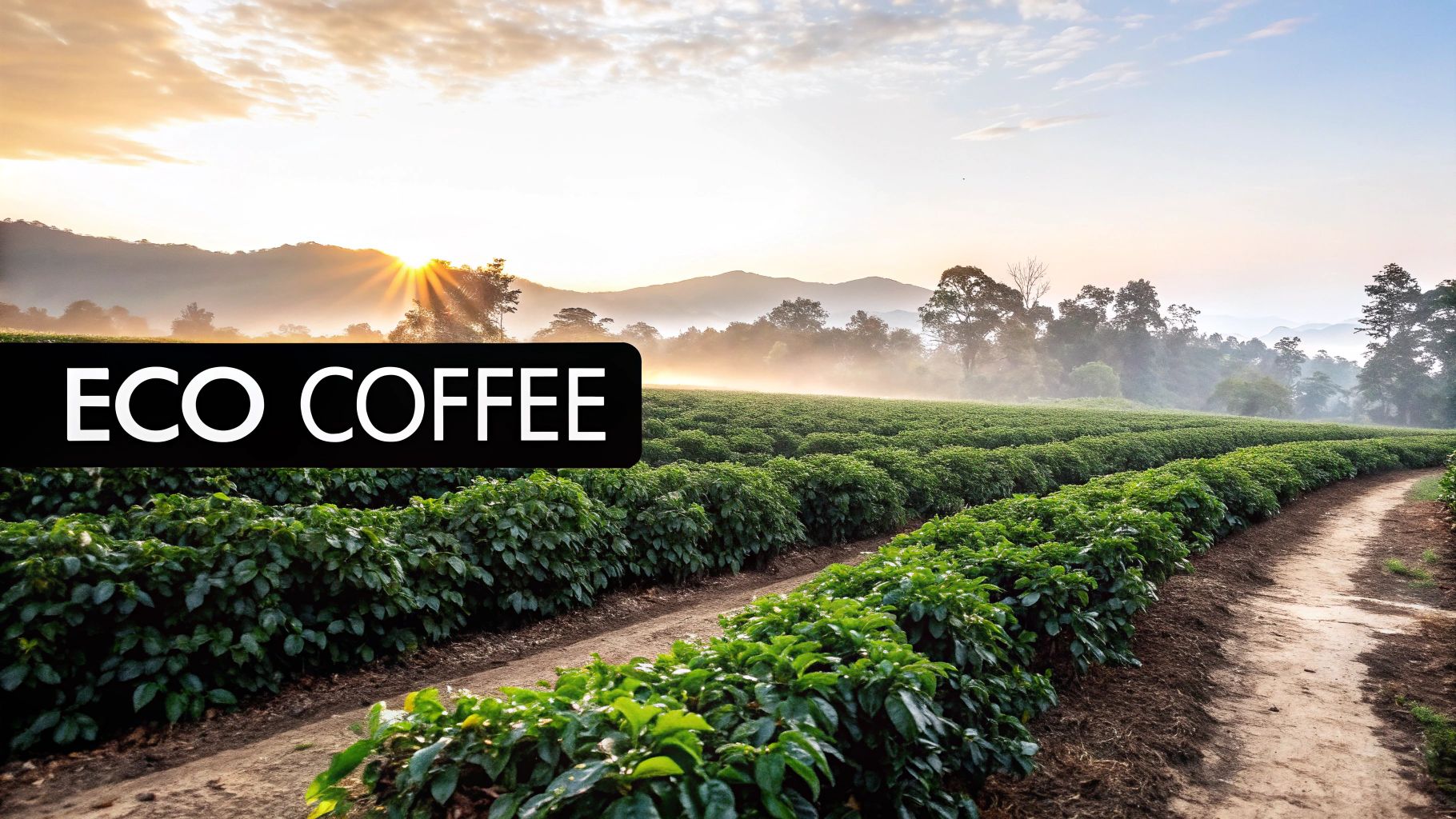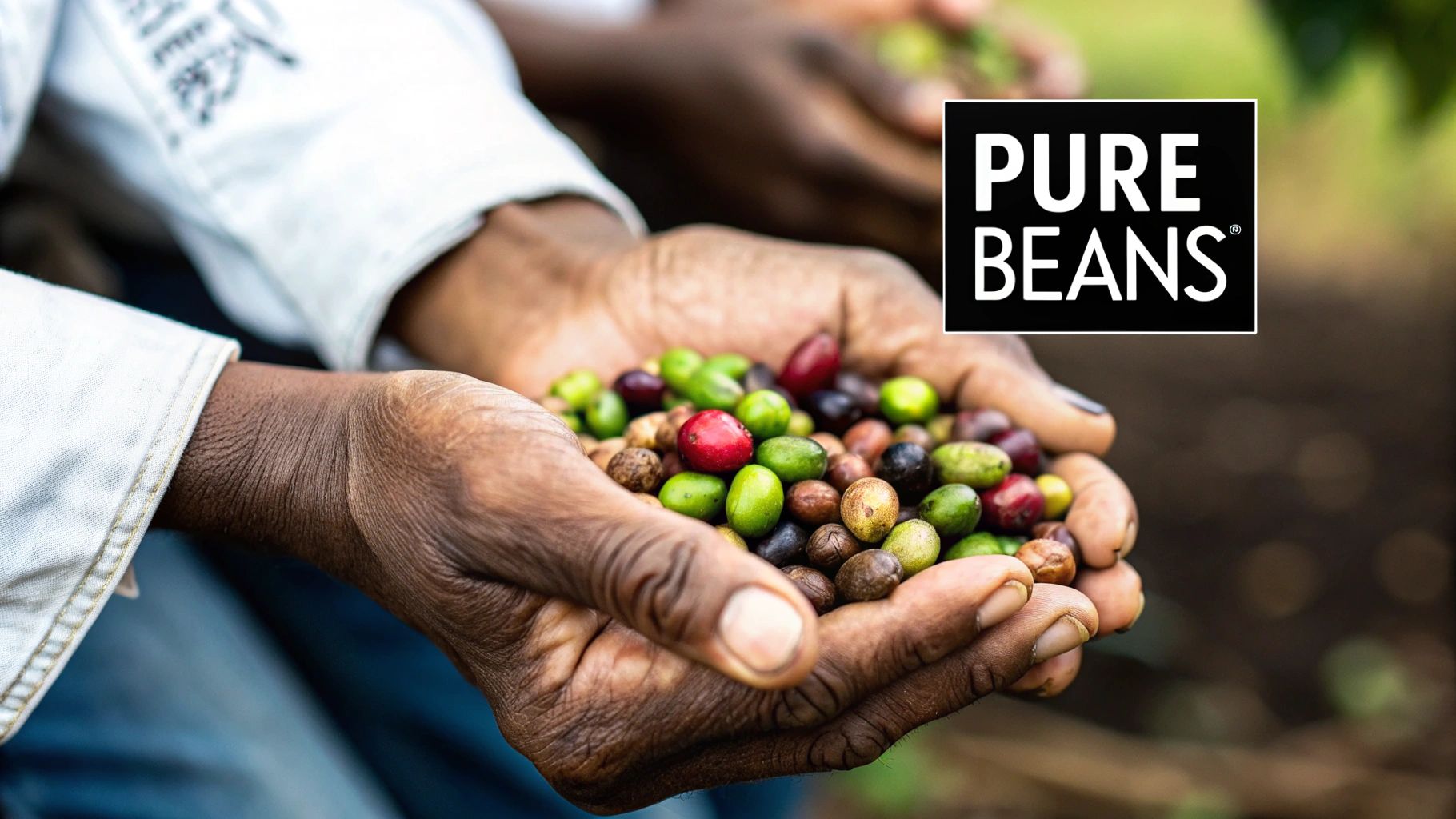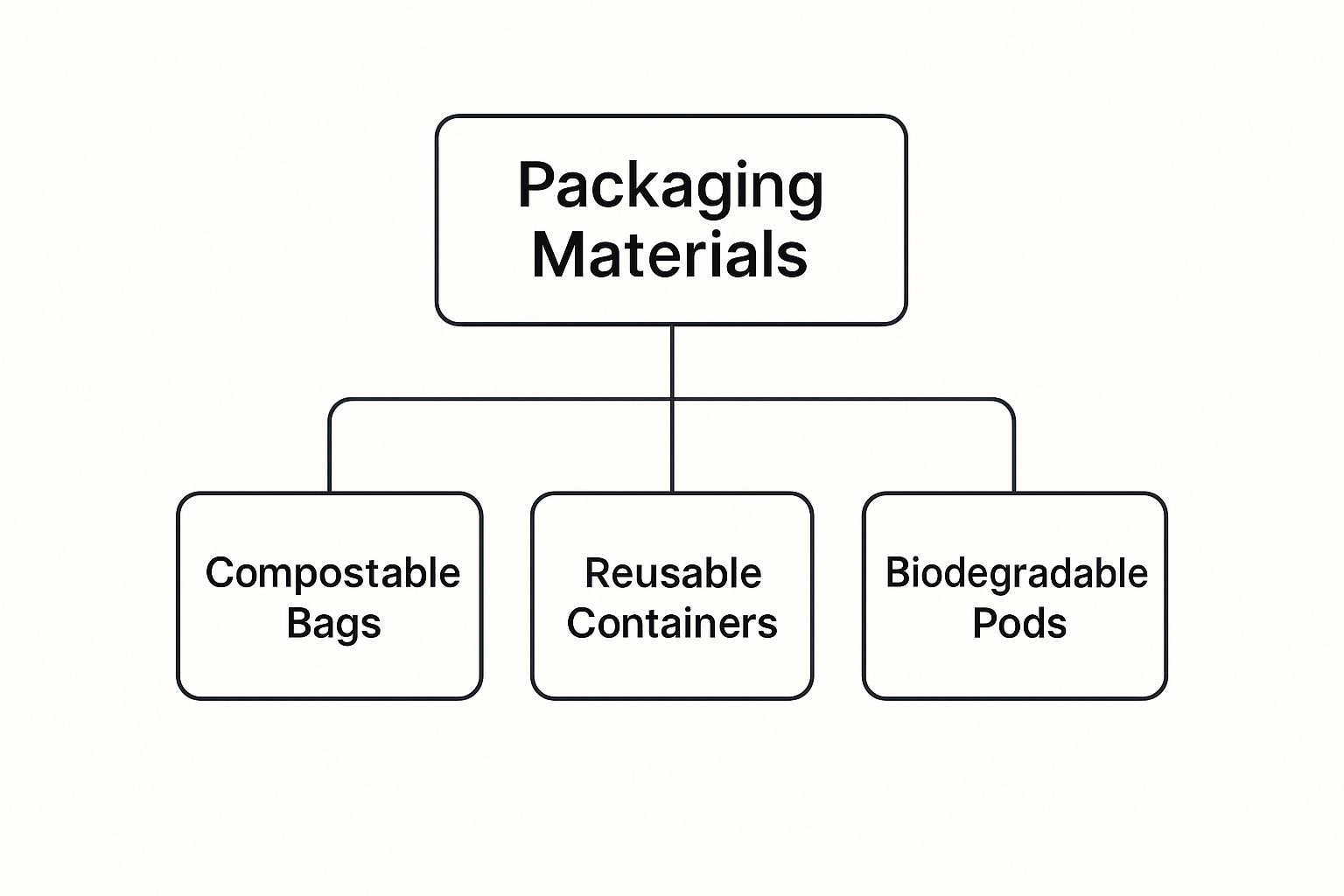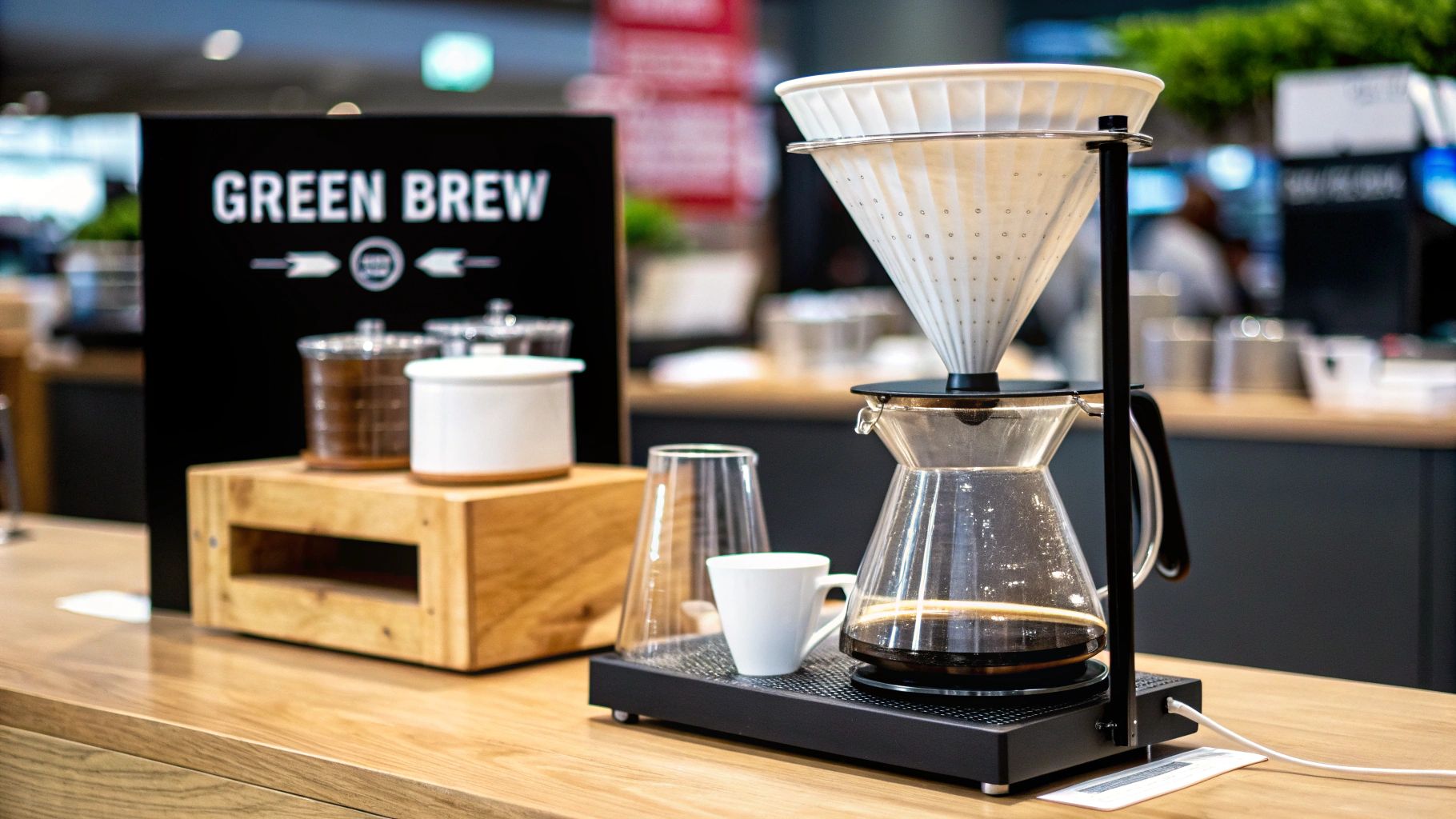
Your Guide to Eco Friendly Coffee in the UK
Share
Your morning coffee ritual holds incredible power—the power to kickstart your day, support communities across the globe, and help protect our planet. This guide is an invitation into the world of eco friendly coffee, showing you how to turn your daily brew into a conscious choice for a better future, right here in the UK. It's about looking beyond the caffeine hit to understand the journey from farm to cup, creating coffee that not only tastes good but does good.
Your Coffee's Journey to Sustainability

Imagine your morning coffee not just as a drink, but as the final chapter in a long story of environmental care and ethical partnerships. That’s what eco friendly coffee is all about. It represents a fundamental shift in how we think about this beloved beverage, moving beyond just the beans themselves to consider the entire supply chain—from the soil where the coffee cherry grows all the way to the cup in your hand.
This holistic view means asking the right questions at every step. Where did this coffee come from? What farming methods were used? Were the workers treated fairly? And what was the environmental cost of getting it to your kitchen in the UK?
At its core, eco friendly coffee is a commitment. It’s a promise that the product you enjoy has been produced with the utmost respect for the planet's resources and the people who cultivate it.
For the discerning UK coffee lover, this means looking past marketing buzzwords and demanding real transparency. It’s about choosing brands that actively champion practices designed to leave the world a better place than they found it.
The Pillars of Eco Friendly Coffee
So, what does this commitment look like on the ground? A truly sustainable brew is built on several key principles, each playing a vital role in its environmental and ethical credentials.
- Sustainable Farming: This is all about working with nature, not against it. Think shade-grown cultivation, which preserves natural habitats for wildlife, and organic practices that ditch harmful pesticides and synthetic fertilisers.
- Ethical Sourcing: This pillar ensures that farmers receive fair wages for their hard work. It empowers them to invest in their communities and continue their sustainable practices for generations to come.
- Reduced Carbon Footprint: From energy-efficient roasters to shorter supply chains, every effort is made to minimise greenhouse gas emissions. To truly grasp what makes coffee eco-friendly, it's helpful to understand how to calculate the carbon footprint of a product, which gives a real measure of its impact.
- Mindful Packaging: The final piece of the puzzle. This involves using materials that are recyclable, compostable, or reusable, ensuring your coffee habit doesn't just add to the landfill problem.
This isn’t just a niche movement anymore; it’s gaining serious momentum. The UK specialty coffee market is seeing a huge transformation, driven by drinkers like you. In fact, the market is projected to grow at a compound annual growth rate (CAGR) of 10.4% between 2025 and 2030—a clear sign that sustainability is no longer an afterthought but a major driving force.
How Sustainable Farming Shapes Your Coffee

Picture a coffee farm. If you’re imagining a sun-scorched field with rows of identical plants, think again. The best sustainable farms look more like vibrant, multi-layered forests—and that’s exactly the point. This is where the story of truly eco friendly coffee begins.
It’s a philosophy that treats coffee growing as part of nature, not something that dominates it. Instead of the industrial-scale farming that so often leads to deforestation and wrecked soil, these methods replenish the land and boost biodiversity. And the best part? They produce coffee beans with far more complex, interesting flavours. For coffee drinkers here in the UK, understanding this gives you a real appreciation for the care that goes into every single cup.
At its heart, sustainable farming is about creating a system that looks after itself. When coffee is grown in harmony with the world around it, the need for chemical interference just melts away.
The Power of Shade-Grown Cultivation
One of the single most important practices in eco friendly coffee is shade-grown cultivation. It’s a traditional method where coffee plants grow under the leafy canopy of native trees, basically mimicking a natural forest. This is a world away from sun-grown monocultures that require huge areas of land to be cleared. Shade-grown farms are absolutely buzzing with life.
That forest canopy provides a home for birds, insects, and other wildlife. The birds act as a natural pest control, so there’s less need for chemical pesticides. At the same time, leaves falling from the trees create a natural mulch on the forest floor.
This organic matter enriches the soil, helps it hold onto water, and completely removes the need for synthetic fertilisers. The result is a healthier farm and less chemical runoff poisoning local rivers and streams.
That shade does something else, too. It slows down how quickly the coffee cherries ripen. This longer maturation time allows the beans inside to develop more complex sugars and acids, leading to a richer, deeper flavour in your cup. It’s a taste you can feel genuinely good about.
Embracing Organic and Water-Wise Methods
With that healthy ecosystem as a foundation, organic principles are the next logical step for an exceptional eco friendly coffee. This means saying a firm no to synthetic pesticides, herbicides, and genetically modified organisms (GMOs). Instead, farmers use natural, time-tested techniques to keep their soil healthy and pests under control.
- Composting: Coffee pulp and other organic bits and pieces are composted and spread back on the soil, creating a nutrient-rich, natural fertiliser.
- Integrated Pest Management: This clever approach uses natural predators and companion planting to manage pests without reaching for a bottle of harsh chemicals.
- Water Conservation: Sustainable farms are smart about their water. They use techniques like rainwater harvesting and super-efficient drip irrigation to minimise their impact, which is absolutely critical in the often drought-prone regions where coffee grows.
These organic practices don't just protect the environment; they also mean you get cleaner beans, free from any chemical residue. This purity lets the coffee's true character—its unique terroir—shine right through.
The Human Element in Sustainability
But here’s the thing: true sustainability isn’t just about trees and water. It’s also about people. Ethical sourcing isn't a "nice-to-have"—it's an essential part of the whole system. If farmers aren't paid fairly, they simply can't afford to invest in the sustainable methods that protect the planet.
When farmers receive a fair and stable price for their crop, it gives them the security to plan for the future. They can invest in better equipment, send their kids to school, and work on long-term environmental projects for their land. It creates a powerful, positive feedback loop: economic stability empowers environmental stewardship.
For the UK speciality coffee scene, this connection is vital. By supporting roasters who build direct, transparent relationships with their farming partners, you ensure your morning coffee is contributing to both a healthier planet and stronger communities. It’s about understanding that a truly sustainable cup is one that lifts people up and preserves the world for the next generation.
Navigating Ethical Coffee Certifications in the UK
Stepping into the coffee aisle of a UK supermarket or speciality shop can feel like trying to decipher a secret code. You're met with a sea of logos and labels, all promising a better, more ethical brew. But what do they actually mean for the planet and the people growing your beans?
Getting your head around these certifications is the key to making choices that truly line up with your values. It turns a simple purchase into a powerful statement of support for a more sustainable world. Think of these logos not as marketing fluff, but as audited promises. Each one represents a tough set of standards that a farm or roaster has to meet to earn that seal of approval.
For any conscious coffee lover in the UK, getting to know the most common labels is the first step toward brewing with total confidence.
Decoding the Main Labels on UK Shelves
While many certifications exist, a few key players dominate the UK speciality coffee market. Each one places a different emphasis on the complex web of social, economic, and environmental factors that make up eco friendly coffee. Knowing their primary focus helps you pick the coffee that champions the causes you care about most.
Here are the big three you're most likely to spot:
- Fairtrade: At its heart, this one is all about people. Its main goal is to empower farmers and workers in developing countries, making sure they receive a fair, stable price for their coffee and an extra premium to invest back into their communities.
- Rainforest Alliance: You’ll recognise this one by its little green frog seal. It takes a really broad approach to sustainability, focusing heavily on environmental protection by promoting biodiversity, conserving natural resources, and pushing for climate-smart agriculture. It also has robust standards for workers' rights.
- Soil Association Organic: As the UK's leading organic certifier, this label is your guarantee that the coffee was grown without any synthetic pesticides, herbicides, or artificial fertilisers. The standards are incredibly strict, zeroing in on soil health and protecting natural ecosystems from harmful chemicals.
This image shows how the idea of sustainability branches out, influencing every choice right down to the materials used for the final product.

As the diagram makes clear, sustainable thinking extends all the way to packaging, with compostable, reusable, and biodegradable options being key.
Comparing Key Eco Coffee Certifications in the UK
It’s really helpful to see these certifications side-by-side to get a clear picture of where their priorities lie. While they all promote better practices, their focus areas differ, letting you tailor your support.
This table breaks down their core missions.
| Certification | Primary Environmental Focus | Primary Social Focus |
|---|---|---|
| Fairtrade | Promotes environmentally sound farming practices as part of its standards, but this isn't the core mission. | Farmer empowerment, fair wages, community development, and stable minimum pricing. |
| Rainforest Alliance | Biodiversity conservation, forest protection, water conservation, and climate resilience. | Worker welfare, safe working conditions, and promoting sustainable livelihoods. |
| Soil Association Organic | Eliminating synthetic chemicals, promoting soil health, and protecting natural ecosystems from pollution. | Prohibits forced labour and ensures fair treatment, with a focus on environmental health benefits. |
By understanding these distinctions, you go from being a passive consumer to an active participant in the global coffee community.
You get to choose which aspect of the eco-friendly coffee movement—be it social justice, biodiversity, or chemical-free farming—to champion with your purchase.
This knowledge empowers you to look beyond a single logo. Many of the finest speciality coffees in the UK might even carry multiple certifications, signalling a deep, multi-faceted commitment to doing things right. Ultimately, these labels are your guide, helping you find a coffee with a story you’re proud to support.
The Role of UK Roasters in Sustainability
The journey of a sustainable coffee bean doesn’t just stop once it leaves the farm. In fact, one of its most important transformations happens right here in the UK, inside the roaring drum of a coffee roaster. This is where raw, green beans become the aromatic, flavourful coffee we all know and love—but it’s an energy-hungry process that can leave a hefty environmental mark.
The most forward-thinking UK roasters, however, are changing the game. They see themselves as the crucial link between incredible, sustainable farms across the globe and the conscious coffee drinker here at home. Their commitment ensures that the bean’s eco-friendly story continues, rather than hitting a dead end at the roastery door.
A sustainable roaster is far more than just a coffee cook; they’re an innovator, a partner, and a vital part of the eco-friendly coffee movement in the UK.
Pioneering Energy Efficiency
Let’s be honest: traditional coffee roasting uses a tremendous amount of gas and electricity. To tackle this, sustainable roasters are investing in modern, energy-efficient equipment. These roasters often have far better insulation and clever heat recirculation technology, letting them use significantly less energy to hit that perfect roast profile.
Some UK roasters are pushing it even further, powering their entire operation with renewable energy. By installing solar panels or switching to a green energy tariff, they slash the carbon footprint of every single bag of coffee that goes out. It’s a powerful statement.
It's a conscious decision to weave sustainability into the very fabric of their business, turning a high-consumption process into a model of environmental responsibility.
This focus on efficiency isn’t just good for the planet; it shows a deep dedication to the craft itself, making sure every bit of energy is channelled into bringing out the coffee's natural character.
A Circular Approach to Waste
A busy roastery produces more than just incredible coffee. There’s also waste, from the jute sacks the green beans arrive in to the flaky chaff that sheds during roasting. A sustainable roaster doesn’t see this as rubbish—they see it as a resource.
They come up with creative, circular solutions to keep as much as possible out of landfill:
- Chaff Repurposing: Coffee chaff is a dry, nitrogen-rich organic material. It's a fantastic addition to compost for local farms or can even be used as animal bedding, returning valuable nutrients straight back to the soil.
- Jute Bag Upcycling: Those tough hessian sacks get a second life, often donated to local gardeners, allotments, or artists for creative projects.
- Closed-Loop Water Systems: Some of the most advanced roasters use systems that cool and recycle water, massively cutting down their consumption during daily operations.
This mindset is becoming more important than ever as UK consumers become more aware of where their products come from. In fact, sustainability is a huge influence on the UK coffee market, which is tipped to reach a value of £7 billion by 2030. This growth is being fired up by drinkers who are happy to pay a bit more for coffee that aligns with their ethical and sustainable values. You can find out more about how these preferences are shaping the future of the UK coffee market.
When you choose a roaster with a clear, transparent commitment to sustainability, you're doing more than just buying a product. You're supporting a local UK business that is actively investing in a healthier planet. They are the essential bridge, making sure the principles of eco-friendly coffee are upheld all the way to your cup.
Choosing Eco Friendly Packaging and Practices
Your commitment to sustainability doesn’t end with the beans. It follows the coffee all the way to the bag it comes in and the way you brew it at home. This final stage of your coffee's journey is where you have the most direct power to make a difference, turning everyday habits into genuinely positive environmental actions.
It’s all about closing the loop. When you consciously choose brands with better packaging and adopt mindful brewing practices, you ensure the entire lifecycle of your coffee—from a distant farm to your kitchen bin—is as gentle on the planet as possible. These small, consistent choices are what drive real change across the UK coffee scene.
The great news? UK roasters are right at the forefront of this shift, exploring brilliant new materials that protect both the flavour of your coffee and the health of our environment.
Understanding Greener Packaging Options
Gone are the days when coffee bags were destined for landfill. Today, the most forward-thinking UK brands offer packaging designed for a second life. When you're weighing up eco-friendly packaging, it helps to understand the wider world of sustainable labelling best practices to make sure your choices truly align with your goals.
Here are the main types you'll come across from UK roasters:
- Fully Compostable Bags: These are the gold standard. Made from plant-based materials like corn starch, they’re designed to break down completely in a home compost bin or an industrial composting facility. Instead of waste, they leave behind nutrient-rich soil.
- Widely Recyclable Materials: Many modern coffee bags are now made from a single material (like LDPE 4 plastic) that can be recycled with your supermarket carrier bags at larger stores. Just look for clear instructions on the packaging.
- Refill Programmes: A growing number of UK roasters are championing a circular economy by offering refill options. This zero-waste approach lets you bring your own container or a reusable tin to be filled up, eliminating packaging altogether.
Choosing a brand that invests in sustainable packaging is a direct vote for a less wasteful industry. It sends a clear message that you value producers who take responsibility for their products from start to finish.
Simple Habits That Make a Big Difference
Beyond the bag, your daily coffee routine holds incredible potential for change. By adopting just a few simple habits, you can dramatically reduce your environmental footprint, one cup at a time. It’s all about making small adjustments that soon become second nature.
These practices aren’t just about cutting down on waste; they’re about honouring the huge amount of resources that went into producing your delicious coffee in the first place.
- Compost Your Coffee Grounds: Used coffee grounds are packed with nitrogen and make a fantastic addition to your home compost bin or garden soil. They enrich the earth and help you grow healthier plants while reducing the amount of waste sent to landfill—where it would otherwise release methane, a potent greenhouse gas.
- Embrace the Reusable Cup: In the UK alone, billions of disposable coffee cups are used each year. Carrying your own reusable cup is one of the single most impactful changes you can make. It’s a simple, powerful habit that conserves resources and prevents a mountain of unnecessary waste.
- Support Local and Transparent Brands: By choosing UK-based roasters that are open about their packaging and sourcing, you support local businesses making a genuine effort. This kind of consumer demand is a powerful driver for change across the entire industry.
This shift towards thoughtful consumption is already shaping the market in a big way. The rise of premiumisation and ethical sourcing is central to the recent growth in the UK coffee sector. Leading operators committed to sustainability have seen substantial gains, with premium chains reporting strong double-digit increases in turnover. It's clear proof of a consumer preference for responsible brands. Your choices truly matter, turning your daily brew into a force for good.
How to Find the Best Eco Friendly Coffee in the UK

Alright, you’re now armed with the knowledge to make a real difference with every single cup you brew. Finding the best eco-friendly coffee isn’t about chasing one perfect, elusive bag. It's about making informed, conscious decisions that actually line up with your values. This is your chance to put everything you've learned into practice and start exploring the UK's vibrant speciality coffee scene with confidence.
Think of it as a journey of discovery. When you know what to look for and the right questions to ask, you stop being just a consumer and become an active participant in a global movement for better coffee. Your choices send a clear signal to roasters and farmers, championing a future where sustainability and exceptional flavour aren't just related—they're one and the same.
Your Practical Buying Checklist
Let's be honest, when you're standing in a coffee shop or scrolling through endless options online, it’s easy to feel overwhelmed. Use this simple checklist as your guide to cut through the marketing noise and pinpoint UK roasters who are genuinely committed to doing things the right way.
- Look Beyond the Logo: Certifications are a great starting point, but they're not the whole story. Dig a little deeper. Does the roaster share specifics about the coffee's origin—the farm, the region, the cooperative? True transparency is the hallmark of an ethical brand.
- Ask About Relationships: Don't be shy. Ask your local barista or drop the roaster an email. Enquire about their sourcing model. Do they work directly with farmers, building long-term partnerships that guarantee fair prices and stability?
- Investigate Their Practices: Check their website or the back of the bag for info on their roasting and packaging. Do they mention using energy-efficient roasters, renewable energy, or compostable bags?
This hands-on approach changes everything. You’re no longer just buying coffee; you’re consciously supporting an entire sustainable supply chain.
What a Truly Ethical Brand Looks Like
A truly ethical brand doesn't just sell coffee; it shares stories. It gives you a clear window into the entire journey of the beans, from the hands that picked them to the roaster that perfected their flavour. For these brands, sustainability isn't a marketing buzzword—it's woven into their DNA.
A roaster dedicated to eco friendly coffee prioritises clear sourcing information, sustainable practices, and measurable community impact. They provide a clear benchmark for what an ethical business should be.
As you explore the diverse world of eco-friendly options, you might even come across guides on how to find the best organic coffee with mushroom and other unique, sustainable products that are pushing the boundaries.
By seeking out roasters who live and breathe these principles, you're doing so much more than buying a bag of beans. You’re investing in a system that values people and the planet in equal measure. You’re ready to explore, ask questions, and discover your perfect, guilt-free brew.
Your Eco-Friendly Coffee Questions, Answered
Stepping into the world of eco-friendly coffee can feel a bit like learning a new language. As you get closer to finding your perfect conscious cup, a few questions naturally pop up. We've put together some clear, straightforward answers to help you brew with confidence.
Think of this as the final piece of the puzzle. With these details sorted, you’ll be ready to champion sustainability in the UK's brilliant speciality coffee scene.
Is Eco-Friendly Coffee More Expensive?
Sometimes, yes—but it helps to think of it as paying the true cost of what's in your cup. That slightly higher price tag isn't just for show; it reflects the incredible amount of work and resources that go into producing coffee the right way. We're talking fair wages for farmers and the tough, rigorous standards needed for certifications.
This price props up a system that genuinely values both people and the planet, instead of one that cuts corners. When you buy an eco-friendly coffee, you're not just buying beans; you're investing in a more sustainable, equitable future for the whole coffee industry.
What Is the Single Most Important Thing to Look For?
While certifications and packaging are definitely important clues, the most powerful sign of a truly eco-friendly coffee is transparency.
When a roaster openly shares the story behind their coffee—the specific farm, the cooperative, even the farmer's name—they’re showing a real commitment. That level of honesty means they have nothing to hide and are genuinely proud of their ethical supply chain.
Can Coffee Pods Ever Be Eco-Friendly?
Absolutely, but you have to choose wisely. Most single-use pods are made from a mix of plastic and aluminium, making them a nightmare to recycle. They almost always end up in landfill, where they'll sit for centuries.
The good news is that a growing number of UK roasters now offer pods made from fully compostable materials. These are designed to break down naturally into nutrient-rich compost, giving you all the convenience of a pod without the environmental guilt. Just be sure to check the packaging to see if they're certified for home or industrial composting.
Does Sustainable Coffee Actually Taste Better?
In our experience, it often does. It turns out that the sustainable farming methods that are better for the planet also happen to be fantastic for developing flavour.
- Shade-Grown Cultivation: Growing coffee under a canopy of trees lets the cherries ripen much more slowly. This extended time on the branch allows more complex sugars and nuanced flavours to develop inside the bean.
- Organic Farming: When the soil is healthy and free from chemical pesticides and fertilisers, the coffee plants are healthier too. Healthier plants produce higher-quality beans with a much cleaner, more vibrant taste profile.
Ultimately, the care and meticulous attention to detail that define eco-friendly coffee nearly always shine through in the final cup. By choosing sustainable, you’re not just making an ethical choice—you're often making a superior flavour choice, too.
At Ue Coffee Roasters, we’re passionate about bridging the gap between exceptional flavour and unwavering ethical standards. Explore our collection of speciality coffees, all sourced with complete transparency and roasted with care, to discover a brew that tastes good and does good. Find your perfect eco-friendly coffee at uecoffeeroasters.com.
